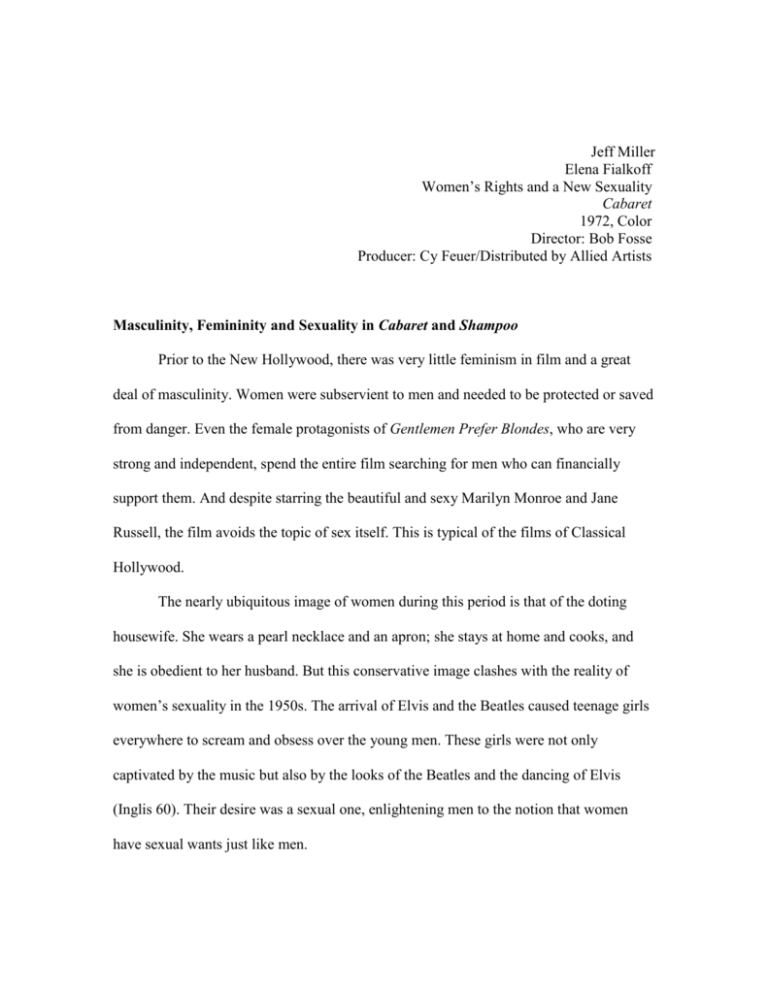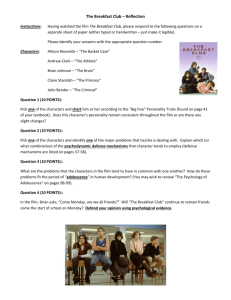
Jeff Miller
Elena Fialkoff
Women’s Rights and a New Sexuality
Cabaret
1972, Color
Director: Bob Fosse
Producer: Cy Feuer/Distributed by Allied Artists
Masculinity, Femininity and Sexuality in Cabaret and Shampoo
Prior to the New Hollywood, there was very little feminism in film and a great
deal of masculinity. Women were subservient to men and needed to be protected or saved
from danger. Even the female protagonists of Gentlemen Prefer Blondes, who are very
strong and independent, spend the entire film searching for men who can financially
support them. And despite starring the beautiful and sexy Marilyn Monroe and Jane
Russell, the film avoids the topic of sex itself. This is typical of the films of Classical
Hollywood.
The nearly ubiquitous image of women during this period is that of the doting
housewife. She wears a pearl necklace and an apron; she stays at home and cooks, and
she is obedient to her husband. But this conservative image clashes with the reality of
women’s sexuality in the 1950s. The arrival of Elvis and the Beatles caused teenage girls
everywhere to scream and obsess over the young men. These girls were not only
captivated by the music but also by the looks of the Beatles and the dancing of Elvis
(Inglis 60). Their desire was a sexual one, enlightening men to the notion that women
have sexual wants just like men.
While this knowledge may not have transferred into film right away, the New
Hollywood was more liberal and revisionist, and its films delved deeper into themes
regarding sex and sexuality. Two films from this era, Bob Fosse’s Cabaret (1972) and
Hal Ashby’s Shampoo (1975), explore blurring gender roles and images of masculinity
and femininity that mirror the sexual revolution of the late 1960s and 1970s.
Shampoo follows the exploits of Beverly Hills hairdresser, George, over the
course of a day and a half. The film delivers mixed messages regarding George’s
sexuality, giving him both masculine and feminine characteristics. George has long hair,
wears fashionably tight clothing, and makes his living as a hairdresser. All of these are
typically regarded as feminine things, and George is mistaken for a homosexual more
than once in the film. But over the course of the film (a day and a half) George has sex
with four different women. Multiple sexual partners and an aggressive sex drive are traits
usually associated with men and are seen as masculine attributes. George also drives a
motorcycle. Motorcycles are loud, brash and dangerous – certainly masculine elements.
The duality of George’s nature is expressed most eloquently in a scene about
thirty minutes into the film. George arrives at his ex-girlfriend Jackie’s house to do her
hair for a party that night. He brings his own hair dryer and arrives with it tucked in his
pants. The shape of the hairdryer and the way it is “holstered” makes it similar to a
handgun. A gun is a somewhat conventional image of masculinity, but here it has been
replaced with an object of femininity.
The blurring of masculine and feminine is also prominent throughout Cabaret,
which is about a brief love affair between a British writer and an American cabaret singer
in 1930s Berlin. The first character to appear onscreen is the Master of Ceremonies (Joel
Grey), a petite man with his hair slicked back who wears heavy makeup and lipstick. He
is similar in build and size to Sally Bowles. Sally is rather androgynous herself – she has
short hair and is often seen without a bra, emphasizing her flat chest. (The most feminine
aspect of her is probably her eyelashes, which are heavily accentuated.) Other shots in the
opening sequence include a cutaway of an unsightly female audience member wearing a
monocle and a shot of a male cabaret dancer putting on a wig (while the emcee is heard
off-screen saying, “the girls are beautiful”). This paradox of calling a man in drag a
“girl,” along with the other mixing of masculine and feminine features in the characters,
hints at the underlying homosexuality and bisexuality of the film.
Sally is a very sexually aggressive female character, even for the New
Hollywood. Her open discussions about “screwing” and syphilis reveal her sexual
promiscuity. It’s unclear whether this is an attempt to highlight her masculine side or an
effort to prove women’s power and sexuality, but the audience can perceive it either way.
In this way, Sally is just like the women of Shampoo; who seem to have an insatiable
sexual desire for George. Likewise, the characters of both films resemble the young
women and girls who so voraciously sought the affections of Elvis and the Beatles.
The sexual revolution in the 1960s and 1970s is reflected in the frankness with
which sexuality is portrayed in Cabaret and Shampoo. According to the 1996 film The
Celluloid Closet, Cabaret was one of the first Hollywood films to openly celebrate the
gay lifestyle. The film is set in Berlin in 1931, at the time of the decline of the Weimer
Republic and the rise of the Nazi party, and, as is to be expected, the Nazi party did not
have a positive view of homosexuality. They believed it to be “a deviation from normal
sexual behavior” and that sexual relations must “serve the reproductive process.”
However, ironically, it was German fascism that unintentionally helped the cultural
decadence of the time, which included homosexuality (Gordon 448). Outsiders sought an
escape in the cabarets since sexual freedom was celebrated and not chastised. It gave
them a newfound independence that they had never experienced before (Miller).
In the film, when Brian Roberts arrives at Sally’s boarding house, Sally just
assumes that their friendship will turn into a romantic relationship. Sally attempts to
seduce Brian, asking him if her body “drives [him] wild with desire.” When he appears
uninterested in her advances, she jokingly comments that he probably does not sleep with
girls, and judging by Brian’s lack of an answer, believes it to be true. Brian clarifies that
he tried sleeping with girls three times, but all of them ended up disastrous. He does not,
however, reveal if the reason his past sexual encounters were disastrous was because he
is in fact gay. Mitchell Morris writes in Cabaret, America’s Weimar, and Mythologies of
the Gay Subject, “The failure of Sally and Brian to establish a romance—because of his
sexual nature, as is made very clear—is central to the rueful tone that is one aspect of the
film’s pervasive irony” (150). It is never explicitly stated that he is homosexual, and it
seems more likely that he is actually bisexual, since he eventually does have a
relationship with Sally. Brian’s sexuality signifies his status as an outsider, similarly to
Sally and the other people who work at the Kit Kat Klub, who go against society’s norms
(Miller).
The film also explores both Sally and Brian’s relationship with Maximilian von
Huene, a rich baron. While it is Sally who first becomes interested in him, it becomes
clear that he is interested in not just Sally, but Brian as well. In one particular scene,
Sally and Maximilian are dancing together when Maximilian decides to grab Brian so
that the three of them are dancing very closely together. They are all so drunk that none
of them seem to be thinking about what is happening, nor do they seem to care. Sally and
Brian both use Max’s affection for them to their advantage, as both are interested in his
money, since, as Sally puts it, he “loves buying things!”
Similarly, in Shampoo, George Roundy uses his job as a hairstylist to meet and
romance his female clients. One client in particular, Felicia Karpf, becomes particularly
useful to George when he decides to create his own salon but lacks the funds to do so.
No bank will lend him any money, but Felicia offers to convince her wealthy
businessman husband, Lester, to invest in him. George uses his good looks and
occupation for financial gain, since Lester assumes that George is gay and sees nothing
odd about his relationship with his wife. This triggers a chain of events that leads to
George being found out by all of the women he had been using. While in Cabaret, Sally
and Brian seem to eventually come to an understanding about their relationship with Max
and with each other, George is left wondering what could have been.
Jeff’s Observation
Cabaret is a highly sexual film but it does not have an overwhelmingly positive
view of sexuality. Linda Mizejewski has suggested that the cabaret transvestites represent
a “warped and monstrous” female sexuality (5). It is more likely that the garish, ugly
cabaret performers instead represent an ugly world full of decadence and bizarre
sexuality.
The film develops two parallel romantic relationships – Brian and Sally’s (which
is interrupted by Max) and Fritz and Natalia’s. Fritz and Natalia’s relationship is the more
reserved relationship, developing slowly with both characters appearing prude with
respect to the other characters in the film. The most aggressive move in the entire
relationship, (when Fritz “pounces” on Natalia) is the result of Sally and Brian’s
persuasion. Fritz and Natalia end up getting married, while Sally and Brian’s more
dysfunctional and deviant sexual relationship (which includes mutual infidelity by both
parties) ends in abortion and their separation.
When Sally and Brian are happy with their relationships, it is more because of
material comforts than love or connection. Both Brian and Sally allow Max’s wealth to
“purchase [their] sexual favors” (Clark 53). One of the cabaret numbers proclaims
“money makes the world go around.” Later, a cutaway to the Master of Ceremonies
mouthing the word “money” during one of Max, Sally and Brian’s outings reminds the
audience why the characters are attracted to Max.
The beginning of Max and Brian’s sexual relationship is visually cued by Brian’s
acceptance of Max’s gift of the gold cigarette case at the beer garden. This scene is
particularly damning of (homo)sexuality because it seems to align the growth of the Nazi
party with the growth of the relationship between Max and Brian. In this scene, a very
effeminate young German boy sings “Tomorrow Belongs to Me.” He is eventually
revealed to be in Nazi uniform, and the audience at the beer garden joins him in his song,
transforming it into an “aggressive march” (Mizejewski 13).
Not every scene regarding sexuality is quite so grave. Other times sexuality can
be fun, beautiful and flirtatious. The most notable example comes when Max, Sally and
Brian have been drinking and dancing together at Max’s estate. As their dance comes to
an end the three get closer together, and Fosse holds the shot as each character makes eye
contact with the others. Their heads move in a way that makes the audience unsure of
who is going to kiss whom. The scene reflects happiness and sexual desire that is apart
from a mere desire for material goods.
Although Shampoo deals with serious themes, it is more playful than Cabaret.
George’s life is full of sex, and seemingly innocent acts even have sexual undertones.
About a half an hour into the film, George is in the salon drying a client’s hair. The
placement of the client’s head and the way in which George is playing with her hair is
reminiscent of oral sex. Everything George does, whether conscious or unconscious,
involves sex.
With a chauvinistic male protagonist, it is perhaps ironic that Shampoo is so
sympathetic to women (but the film is full of ironies, after all). For all of the sleeping
around he does, George listens to women and tries to please them in an immediate way
(Lev 68). Lev also says that George understands women better than Lester does, which is
evident by what George tells him at the end of the film:
“I'm on my feet all day long listening to women talk and they
only talk about one thing: how some guy fucked them
over…that's all that's on their minds…Face it, they know we're
always trying to nail them and they don't like it.”
George’s revelation into understanding women gives the film a feminist tinge. For a brief
moment, events in the film are seen through the eyes of a woman, which was very rare in
the films of New Hollywood.
The ending of the film, in which Jackie chooses Lester over George, has
complicated implications in regards to feminism. On one hand, Jackie chooses the
wealthier and more powerful man in Lester (Man 139), a regression towards the idea that
women must be provided for and nurtured. In reality, Jackie has chosen for herself,
deciding that Lester’s money is more important than George’s beauty and sex. By making
the decision herself, with no regard to how Lester or George feel, she expresses power
over both men.
Works Cited
Clark, Randy. "Bending The Genre: The Stage And Screen Versions Of Cabaret."
Literature Film Quarterly 19.1 (1991): 51. Film & Television Literature Index
with Full Text. Web.
Ebert, Roger. "Cabaret." Rogerebert.com. 01 Jan. 1972. Web. 10 May 2012.
<http://www.rogerebert.com/>.
Gordon, Terri J. “Film in the Second Degree: Cabaret and the Dark Side of Laughter.”
Proceedings of the American Philosophical Society 152 (Dec. 2008): 440-465.
Print.
Inglis, Ian. “Ideology, Trajectory & Stardom: Elvis Presley & The Beatles.” International
Review of the Aesthetics and Sociology of Music, Vol. 27, No. 1 (Jun., 1996). pp.
53-78. Print.
Lev, Peter. American Films of the '70s: Conflicting Visions. Austin, TX: University of
Texas, 2000. Print.
Man, Glenn. “Women in Love: The Stepford Wives and Shampoo.” American Cinema of
the 1970s: Themes and Variations. Ed. Lester D. Friedman. New Brunswick, NJ:
Rutgers UP, 2007. Print.
Miller, Scott. "Inside Cabaret." New Line Theatre. 2002. Web. 29 Apr. 2012.
<http://www.newlinetheatre.com/cabaretchapter.html>.
Mizejewski, Linda. "Women, Monsters, and the Masochistic Aesthetic in Fosse’s
Cabaret." Journal of Film and Video 39.4 (1987): 5-17.
Morris, Mitchell. "Cabaret, America's Weimar, and Mythologies of the Gay Subject."
American Music 22 (2004): 146-55. Print.
The Celluloid Closet. Dir. Rob Epstein and Jeffrey Friedman. TriStar Pictures, 1996.






